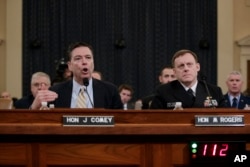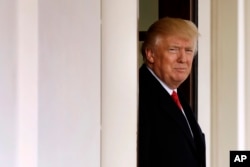If much of the United States was transfixed by the Congressional testimony of two of America’s top intelligence officials on allegations of Russian meddling in the U.S. elections, the Kremlin claimed it had better things to do.
“We have many concerns in the Kremlin and following that [debate] isn’t one of them,” said Presidential spokesman Dmitry Peskov.
“New information we’re not hearing and doubtfully will hear,” said Peskov, who went on to compare the hearings to a “broken record” being played ad nauseam. "It’s an internal American issue ... our relationship to all this hysteria is well known.”
During testimony before the House Intelligence Committee Monday, FBI Director James Comey confirmed his agency is investigating Russian attempts to interfere in the U.S. election, including whether President Donald Trump's campaign aides criminally colluded with Russian interests to help Trump win.
Nyet, Nyet, and Nyet Again
The Kremlin has been nothing if not consistent in its response to the allegations emanating from Washington. In a word: deny.
There was Vladimir Putin last September insisting that “Russia on a state level has never practiced” cyber intrusions. Putin also insisted the contents of hacked emails were a public service.
There was spokesman Peskov, last October, calling allegations of Russian hacking of Democratic National Committee (DNC) computer infrastructure simply “nonsense.”
And there was Putin, in his annual news conference last December, dismissing allegations Russian hacking tipped the election in Trump’s favor or colluded with Trump campaign officials along the way.
Democrats who accuse Russia of such allegations, said Putin, “are looking for someone outside to blame.” The Russian leader went on to note that Democratic candidates lost big in election contests in the Congress and Senate as well.
“Is that also our work, my work?” asked Putin.
Yahoo
Just last week, the Kremlin was at it again, denying U.S. charges that Russian intelligence agents were involved in the hacking of millions of Yahoo users email accounts.
Spokesman Peskov said Russia had only learned of the indictments of its agents and two other men through the media, and hoped U.S. officials would soon shed light on the charges.
Peskov added that Russia had never been involved in any illegal state-sponsored hacking. "We have said repeatedly that there can be no discussion of any official involvement of any Russian office, including the FSB (Federal Security Service), being involved in any unlawful cyber activities," said Peskov.
Better days gone
Trump’s victory in the November election was heralded by many here as an opportunity, after years of deeply antagonistic relations with the Obama administration, a chance for a Trump White House to cooperate with the Kremlin on a host of issues – including Syria and the fight against terror. Even sanctions relief over Russia’s actions in Ukraine was considered within the realm of possible.
Yet the continued and open-ended investigation into Russian interference in U.S, elections has Russian officials acknowledging the tough road ahead.
"It's doubtful to consider [the hearings] a constructive in the development of joint relations," noted Peskov, speaking Tuesday in Moscow.
Time and again, Russian officials have portrayed the Congressional investigations as attempts by Trump's enemies in Washington to derail the president’s calls for improved U.S.-Russian relations at any cost.
President Trump appeared to acknowledge the potential constraints the election scandal presented to détente with Moscow during his first official news conference last month.
"Probably Putin assumes that he’s not going to be able to make a deal with me because it’s politically not popular for me to make a deal," said Trump.
Kremlin officials appear to agree. They openly quote from President Trump’s own tweets on the matter, calling the continued focus on Russia “paranoia”, and a “witch hunt” reminiscent of the red-baiting McCarthy era during the Cold War.










